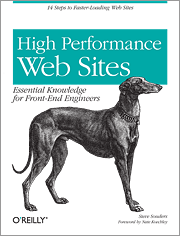 I’m starting to get involved in this book, High Performance Web Sites by Steve Souders. My boss picked it up and read it and had really good things to say. Then the CEO read it and was really geeked about it. So, I decided that I’d better give it more than the cursory glance that I’d previously allotted it. I know that there is a lot of push to write one’s server code to run as quickly as possible, but I feel that the subjects that this book is covering are being largely overlooked.
I’m starting to get involved in this book, High Performance Web Sites by Steve Souders. My boss picked it up and read it and had really good things to say. Then the CEO read it and was really geeked about it. So, I decided that I’d better give it more than the cursory glance that I’d previously allotted it. I know that there is a lot of push to write one’s server code to run as quickly as possible, but I feel that the subjects that this book is covering are being largely overlooked.
Mr. Souders wrote the book while he was a Yahoo employee (he works at Google as of January 7th). He is also the creator of YSlow and an expert in web performance. However, you can actually get a lot of the tips if you check out this page and install YSlow onto your machine. YSlow is an addon for Firebug, itself a plugin for Firefox. If you are doing web development, you should already know about Firebug. If you don’t, run – don’t walk – to download it and you can thank me later.
When you run YSlow, it analyzes the current page for each of the 13 points that the Yahoo Developer Network has identified as major causes of web site slowness. It assigns you a grade to each item and gives the site an overall score. For instance, this blog scores a D (65). According to YSlow, I need to add an expires header, use GZip compression, and configure ETags in order to get this site up to par. As an experiment, I may very well dig into trying to get my score up to at *least* a B! If you aren’t sure what these points mean or what I’m talking about, you should check out the links above or get the book.
The book is very well written and is grouped in such a way so that it can be digested separately by different members of a team or by one person. The appendices of the book contain case studies of several major sites using the tools I discussed above and explains what each could do to improve user experience. At $20.00 on Amazon (and used from $11 and change), every web developer really should read this book, implement it, and keep it as a reference for future development.
